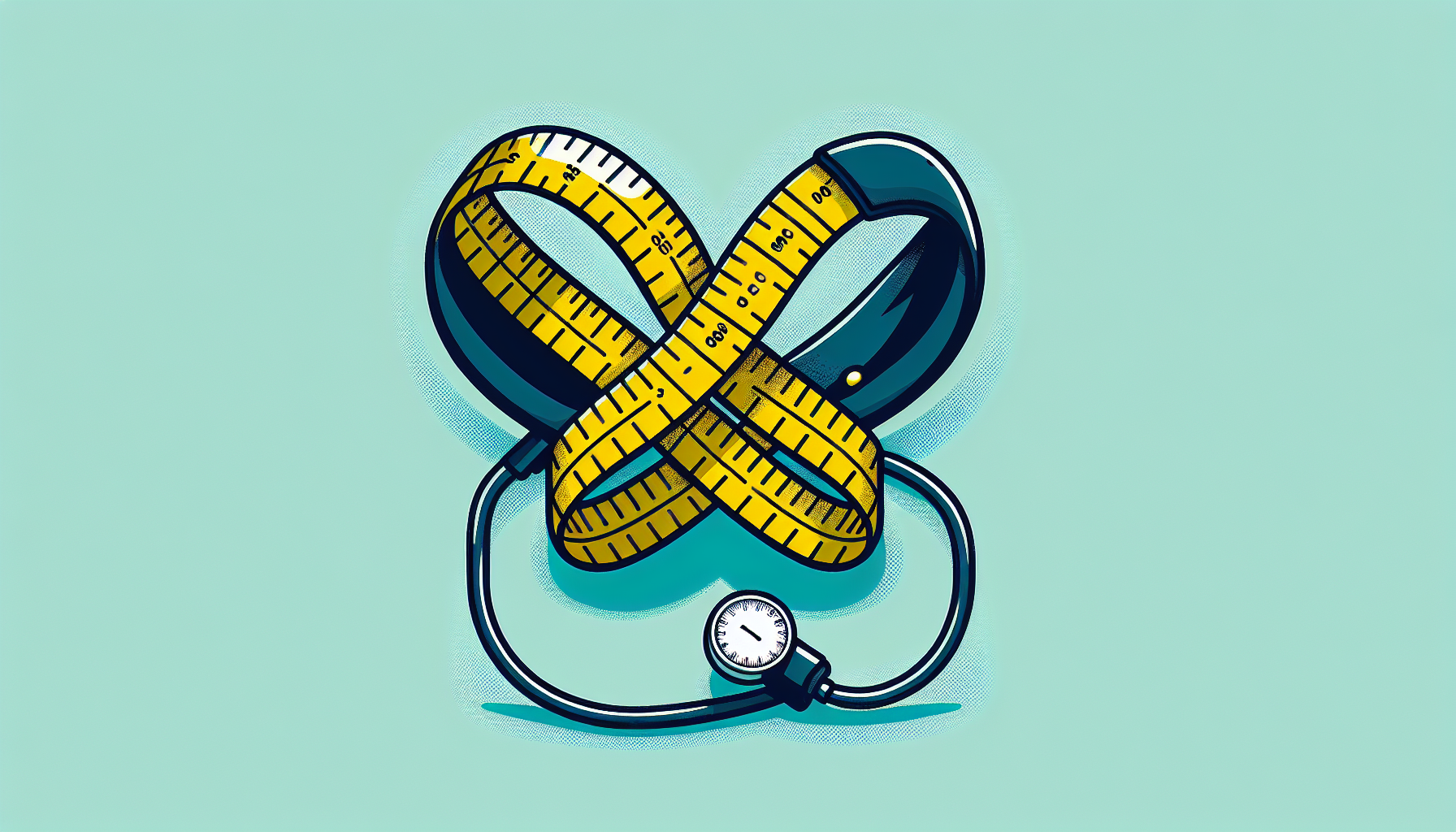Did you know that obesity and high blood pressure go hand in hand? Recent scientific studies have revealed a dangerous relationship between these two health issues. In fact, one study conducted by the National Institute of Health found that individuals who are obese are more likely to develop high blood pressure compared to those who maintain a healthy weight. Another study published in the Journal of the American Medical Association discovered that even a modest weight loss can significantly reduce blood pressure levels in overweight individuals. These findings shed light on the importance of addressing obesity as a means of preventing and managing high blood pressure.
Click Here for Proven Fat-Burning Strategies!
Introduction and Definition of Terms
Definition of obesity
Obesity is a condition characterized by the accumulation of excess body fat, leading to negative effects on health. It is typically determined by calculating the Body Mass Index (BMI), which takes into account a person’s weight and height. A BMI of 30 or higher is considered obese.
Definition of blood pressure
Blood pressure refers to the force exerted by the flowing blood against the walls of blood vessels. It is measured using two numbers: systolic pressure, which represents the pressure in the arteries when the heart contracts, and diastolic pressure, which represents the pressure when the heart is at rest. Blood pressure is typically measured in millimeters of mercury (mmHg).
Prevalence and Impact of Obesity
Increasing rates of obesity worldwide
Obesity has become a global epidemic, with rates steadily increasing over the past few decades. According to the World Health Organization (WHO), in 2016, more than 1.9 billion adults were overweight, and over 650 million were obese. This alarming trend is not only seen in developed countries but also in low- and middle-income countries, where the prevalence of obesity has nearly tripled since 1975.
Connection between obesity and various health issues
Obesity is not just a cosmetic concern; it significantly impacts overall health. It has been linked to an increased risk of numerous health issues, including type 2 diabetes, certain types of cancer, musculoskeletal disorders, and cardiovascular diseases. Furthermore, obesity can lead to decreased quality of life, psychological distress, and increased healthcare costs.
Impact of obesity on cardiovascular health
One of the most significant health risks associated with obesity is its impact on cardiovascular health. Obesity increases the likelihood of developing various cardiovascular conditions, such as high blood pressure, coronary artery disease, and congestive heart failure. Understanding the link between obesity and high blood pressure is of utmost importance in addressing this dangerous liaison.
Unlock Your Path to a Healthier You!
Understanding Blood Pressure
Explanation of blood pressure
Blood pressure is a vital sign that measures the pressure exerted by blood against the walls of blood vessels. It is essential for the normal functioning of the cardiovascular system, as it ensures the delivery of oxygen and nutrients to organs and tissues. Blood pressure is influenced by factors such as heart rate, blood volume, and the elasticity of blood vessels.
Normal blood pressure range
A normal blood pressure reading is typically around 120/80 mmHg. This value is considered optimal for overall health and reflects a well-functioning cardiovascular system. However, it is essential to note that blood pressure can vary depending on various factors such as age, gender, and individual health conditions.
Types of blood pressure
There are two primary types of blood pressure: primary (essential) hypertension and secondary hypertension. Primary hypertension refers to high blood pressure without an identifiable cause, often attributed to lifestyle factors and genetic predisposition. Secondary hypertension, on the other hand, is a result of an underlying health condition, such as kidney disease or hormonal disorders.
Link between Obesity and Increased Blood Pressure
Scientific studies establishing the correlation
Numerous scientific studies have established a clear correlation between obesity and increased blood pressure. One study conducted by Wang et al. (2018) found that overweight and obesity were associated with a higher prevalence of hypertension. The researchers observed that each incremental increase in BMI was associated with an increased likelihood of developing high blood pressure.
Factors contributing to elevated blood pressure in obese individuals
Several factors contribute to elevated blood pressure in obese individuals. Firstly, excess body fat increases the production of inflammatory molecules and oxidative stress, leading to inflammation and damage to blood vessels. Additionally, obesity is closely linked to insulin resistance and metabolic syndrome, which further contribute to high blood pressure. Finally, the activation of the renin-angiotensin-aldosterone system, a hormonal system that regulates blood pressure, is heightened in obese individuals.
Mechanisms and Biological Processes
Inflammation and oxidative stress
Obesity promotes a state of chronic low-grade inflammation and oxidative stress within the body. Adipose tissue, particularly visceral fat, releases pro-inflammatory cytokines and reactive oxygen species, which cause damage to blood vessels and impair their ability to relax and contract normally. This persistent inflammation and oxidative stress contribute to the development of high blood pressure.
Insulin resistance and metabolic syndrome
Obesity is closely associated with insulin resistance, a condition in which cells do not respond properly to the hormone insulin. Insulin resistance is a key component of metabolic syndrome, a cluster of conditions that includes high blood pressure, elevated blood sugar levels, abnormal cholesterol levels, and excess abdominal fat. Insulin resistance and metabolic syndrome further contribute to the development of hypertension in obese individuals.
Activation of the renin-angiotensin-aldosterone system
The renin-angiotensin-aldosterone system (RAAS) plays a crucial role in regulating blood pressure. In obese individuals, the RAAS is often overactivated, leading to increased levels of angiotensin II, a potent vasoconstrictor. The excessive vasoconstriction caused by angiotensin II contributes to elevated blood pressure and the development of hypertension.
Impact on Cardiovascular Health
Hypertension as a major risk factor for heart disease
Hypertension, or high blood pressure, is a significant risk factor for heart disease. It puts added strain on the heart, making it work harder to pump blood efficiently. Over time, this increased workload can lead to the thickening of the heart muscle (left ventricular hypertrophy) and the development of heart failure, coronary artery disease, and other cardiovascular complications.
Obesity-induced hypertension increasing the risk of cardiovascular problems
Obesity-induced hypertension significantly increases the risk of developing cardiovascular problems. According to a study conducted by Poulter et al. (2005), obese individuals with hypertension had a substantially higher risk of experiencing cardiovascular events, including heart attacks and strokes. The combination of obesity and high blood pressure creates a dangerous synergy that magnifies the risk of cardiovascular complications.
Other Health Risks Associated with Obesity and High Blood Pressure
Diabetes and insulin resistance
Obesity and high blood pressure are closely linked to the development of type 2 diabetes and insulin resistance. The combination of these conditions further exacerbates the risk of cardiovascular complications. A study by Stamler et al. (2010) found that individuals with both obesity and high blood pressure had a significantly higher prevalence of diabetes compared to those without obesity or hypertension.
Kidney disease
Obesity and high blood pressure also contribute to the development of kidney disease. The excessive pressure exerted on the delicate structures of the kidneys can lead to impaired kidney function and the development of chronic kidney disease. A study conducted by Kurella et al. (2005) demonstrated that obesity and hypertension were independent risk factors for the progression of chronic kidney disease.
Stroke and cerebrovascular diseases
The combination of obesity and high blood pressure significantly increases the risk of stroke and other cerebrovascular diseases. Hypertension damages blood vessels throughout the body, including those in the brain, making them more prone to rupture or blockage. A study by Wolf-Maier et al. (2003) found that obesity and high blood pressure were strong predictors of stroke incidence.
Effects on Target Organs
Heart: Left ventricular hypertrophy
One of the primary effects of obesity-induced hypertension on the heart is the development of left ventricular hypertrophy (LVH). LVH refers to the thickening of the heart muscle, specifically the left ventricle, in response to the increased workload imposed by high blood pressure. LVH is associated with an increased risk of heart failure, arrhythmias, and cardiovascular events, further highlighting the dangerous consequences of obesity and high blood pressure.
Kidneys: Nephropathy and renal dysfunction
Obesity and high blood pressure can lead to kidney damage and the development of nephropathy, a condition characterized by impaired kidney function. The excessive pressure exerted on the kidneys can damage the filtering units (glomeruli) and impair their ability to remove waste products from the blood. Over time, this can progress to chronic kidney disease and end-stage renal disease.
Brain: Increased risk of cognitive decline
Obesity and high blood pressure have a detrimental impact on brain health and increase the risk of cognitive decline. Hypertension damages blood vessels in the brain, leading to reduced blood flow and oxygen supply to vital areas involved in cognition. A study by Raffaitin et al. (2011) found that obesity and high blood pressure were associated with an increased risk of cognitive impairment and dementia later in life.

Management and Prevention Strategies
Lifestyle modifications (diet and exercise)
The management and prevention of obesity and high blood pressure revolve around lifestyle modifications, particularly in terms of diet and exercise. Adopting a healthy eating plan, rich in fruits, vegetables, whole grains, and lean proteins, while limiting the intake of processed foods, saturated fats, and added sugars, is essential. Regular physical activity, such as aerobic exercises and strength training, helps control weight, improve cardiovascular health, and lower blood pressure.
Pharmacological interventions
In cases where lifestyle modifications alone are insufficient, pharmacological interventions may be necessary. Medications such as antihypertensive drugs, lipid-lowering agents, and glucose-lowering medications may be prescribed to manage blood pressure, cholesterol levels, and blood sugar control. However, it is crucial to combine medication use with ongoing lifestyle modifications for optimal results.
Importance of early detection and regular check-ups
Early detection of obesity and high blood pressure is vital in preventing related health complications. Regular check-ups with healthcare professionals can help monitor blood pressure levels, body weight, and overall health. Detecting and addressing these conditions promptly allows for timely intervention and the implementation of preventative measures to reduce the associated risks.
Conclusion
The dangerous liaison between obesity and high blood pressure is well-established in scientific literature. Obesity not only increases the risk of developing high blood pressure but also magnifies its detrimental impact on cardiovascular health. The relationship between obesity and high blood pressure is complex and involves various mechanisms and biological processes, including inflammation, insulin resistance, and activation of the renin-angiotensin-aldosterone system.
The consequences of this dangerous liaison are far-reaching, extending beyond cardiovascular health. Obesity and high blood pressure contribute to the development of diabetes, kidney disease, stroke, and cognitive decline. Furthermore, these conditions exert detrimental effects on target organs such as the heart, kidneys, and brain.
Addressing obesity is crucial in preventing the associated health complications, including high blood pressure. Lifestyle modifications, including healthy eating habits and regular physical activity, form the foundation of management and prevention strategies. Pharmacological interventions may also be necessary in certain cases. Early detection through regular check-ups allows for timely intervention and monitoring of risk factors.
By recognizing the link between obesity and high blood pressure and taking proactive steps to address these conditions, individuals can significantly improve their overall health and reduce the risk of associated complications. It is essential to prioritize the management and prevention of obesity to mitigate the dangerous impact of this liaison.

